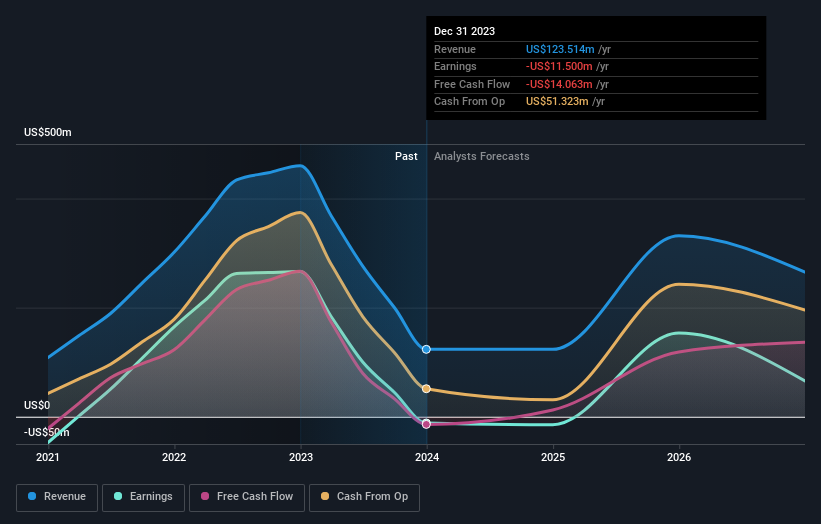Gulf Keystone Petroleum Limited (LON:GKP) most popular amongst retail investors who own 55% of the shares, institutions hold 26%
Key Insights
Significant control over Gulf Keystone Petroleum by retail investors implies that the general public has more power to influence management and governance-related decisions
44% of the business is held by the top 25 shareholders
Every investor in Gulf Keystone Petroleum Limited (LON:GKP) should be aware of the most powerful shareholder groups. We can see that retail investors own the lion's share in the company with 55% ownership. That is, the group stands to benefit the most if the stock rises (or lose the most if there is a downturn).
And institutions on the other hand have a 26% ownership in the company. Institutions often own shares in more established companies, while it's not unusual to see insiders own a fair bit of smaller companies.
Let's take a closer look to see what the different types of shareholders can tell us about Gulf Keystone Petroleum.
Check out our latest analysis for Gulf Keystone Petroleum
What Does The Institutional Ownership Tell Us About Gulf Keystone Petroleum?
Institutional investors commonly compare their own returns to the returns of a commonly followed index. So they generally do consider buying larger companies that are included in the relevant benchmark index.
As you can see, institutional investors have a fair amount of stake in Gulf Keystone Petroleum. This suggests some credibility amongst professional investors. But we can't rely on that fact alone since institutions make bad investments sometimes, just like everyone does. It is not uncommon to see a big share price drop if two large institutional investors try to sell out of a stock at the same time. So it is worth checking the past earnings trajectory of Gulf Keystone Petroleum, (below). Of course, keep in mind that there are other factors to consider, too.
Our data indicates that hedge funds own 15% of Gulf Keystone Petroleum. That catches my attention because hedge funds sometimes try to influence management, or bring about changes that will create near term value for shareholders. Lansdowne Partners Limited is currently the company's largest shareholder with 15% of shares outstanding. In comparison, the second and third largest shareholders hold about 6.1% and 4.7% of the stock.
A deeper look at our ownership data shows that the top 25 shareholders collectively hold less than half of the register, suggesting a large group of small holders where no single shareholder has a majority.
While it makes sense to study institutional ownership data for a company, it also makes sense to study analyst sentiments to know which way the wind is blowing. There are a reasonable number of analysts covering the stock, so it might be useful to find out their aggregate view on the future.
Insider Ownership Of Gulf Keystone Petroleum
The definition of company insiders can be subjective and does vary between jurisdictions. Our data reflects individual insiders, capturing board members at the very least. The company management answer to the board and the latter should represent the interests of shareholders. Notably, sometimes top-level managers are on the board themselves.
Insider ownership is positive when it signals leadership are thinking like the true owners of the company. However, high insider ownership can also give immense power to a small group within the company. This can be negative in some circumstances.
Our most recent data indicates that insiders own less than 1% of Gulf Keystone Petroleum Limited. It seems the board members have no more than UK£1.4m worth of shares in the UK£234m company. We generally like to see a board more invested. However it might be worth checking if those insiders have been buying.
General Public Ownership
The general public -- including retail investors -- own 55% of Gulf Keystone Petroleum. This size of ownership gives investors from the general public some collective power. They can and probably do influence decisions on executive compensation, dividend policies and proposed business acquisitions.
Next Steps:
It's always worth thinking about the different groups who own shares in a company. But to understand Gulf Keystone Petroleum better, we need to consider many other factors. Case in point: We've spotted 1 warning sign for Gulf Keystone Petroleum you should be aware of.
Ultimately the future is most important. You can access this free report on analyst forecasts for the company.
NB: Figures in this article are calculated using data from the last twelve months, which refer to the 12-month period ending on the last date of the month the financial statement is dated. This may not be consistent with full year annual report figures.
Have feedback on this article? Concerned about the content? Get in touch with us directly. Alternatively, email editorial-team (at) simplywallst.com.
This article by Simply Wall St is general in nature. We provide commentary based on historical data and analyst forecasts only using an unbiased methodology and our articles are not intended to be financial advice. It does not constitute a recommendation to buy or sell any stock, and does not take account of your objectives, or your financial situation. We aim to bring you long-term focused analysis driven by fundamental data. Note that our analysis may not factor in the latest price-sensitive company announcements or qualitative material. Simply Wall St has no position in any stocks mentioned.


